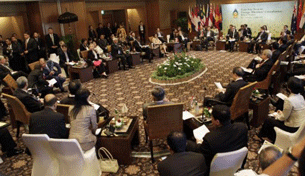Beijing warning follows pact
| Publisher | Radio Free Asia |
| Publication Date | 22 July 2011 |
| Cite as | Radio Free Asia, Beijing warning follows pact, 22 July 2011, available at: https://www.refworld.org/docid/4e3904dd28.html [accessed 1 June 2023] |
| Disclaimer | This is not a UNHCR publication. UNHCR is not responsible for, nor does it necessarily endorse, its content. Any views expressed are solely those of the author or publisher and do not necessarily reflect those of UNHCR, the United Nations or its Member States. |
2011-07-22
China's neighbors are told not to involve other countries in the South China Sea dispute.
 Ministers of the East Asia Summit forum hold talks on the sidelines of an ASEAN meeting on Indonesia's Bali island, July 22, 2011. AFP
Ministers of the East Asia Summit forum hold talks on the sidelines of an ASEAN meeting on Indonesia's Bali island, July 22, 2011. AFP
China's official media followed up the inking of a pact aimed at governing conduct in the disputed South China Sea with a warning to the international community on Friday that Beijing's restraint shouldn't be seen as weakness.
"No one should underestimate China's resolve to protect every inch of its territories," the official Xinhua news agency said in an editorial on Friday ahead of a key regional security summit.
"China's restraint and goodwill should not be misinterpreted as weakness," the article warned.
U.S. Secretary of State Hillary Clinton on Friday welcomed the deal, which lists conduct guidelines that could pave the way for a broader accord on sovereignty over the vast sea, believed to be rich in oil and which is one of the busiest shipping lanes in the world.
The guidelines mark a slight respite in tensions especially around the disputed Spratly and Paracel island chains, claimed in their entirety by China, Taiwan, and Vietnam and in part by the Philippines, Malaysia, and Brunei.
"I want to commend China and ASEAN for working so closely together to include implementation guidelines for the declaration of conduct in the South China Sea," said Clinton after arriving in Bali ahead of talks hosted by the ASEAN Regional Forum (ARF) at the weekend.
Elusive
A wider accord on which country owns what remains elusive. The issue has heated up in recent months with several incidents between claimants, particularly involving China.
The guidelines adopted by Beijing and the Association of Southeast Asian Nations (ASEAN) sets out agreed measures to make the 2002 Declaration of Conduct (DOC) of Parties in the contested South China Sea more binding.
Some diplomats said Beijing agreed to the guidelines after almost a decade of deadlock in an apparent attempt to prevent the topic from dominating Saturday's meeting of the ARF, a key regional security body.
Analysts said that China is unlikely to welcome any form of multilateral debate over the disputed maritime region.
The Xinhua commentary seemed to support this view, warning its neighbors not to involve other countries in the dispute.
"These countries should also bear in mind that the wolf has a winning game when the shepherds quarrel," the article said.
"As China has repeatedly stressed, the South China Sea disputes are essentially bilateral issues between China and other individual claimant countries," it said.
"Such issues should be handled bilaterally, and history has demonstrated again and again that China and ASEAN countries are able to solve their own problems," the article said.
Clinton angered China last year when she told the ARF that the United States had a "national interest" in the South China Sea and could facilitate talks.
Beijing saw it as a signal that Washington would interfere in the territorial dispute.
Military exercises
Vietnam and China have held separate live-fire military exercises in the disputed maritime region near the Spratly and Paracel island chains after Hanoi accused Chinese ships of ramming one oil survey ship and cutting the exploration cables of another.
Hanoi also said sailors from China's navy had beaten the captain of a Vietnamese fishing boat and confiscated its catch.
The standoff sparked a wave of anti-China protests in Vietnam and warnings from Beijing to Vietnam not to try to involve the United States.
Last week, Vietnam and the United States carried out joint naval exercises in spite of disapproval from China.
China has underlined its "indisputable sovereignty" over the South China Sea, saying its claims stretch back at least to the 1930s, when official maps from Beijing contained the whole sea as Chinese territory.
Beijing has also rejected calls by ASEAN states for arbitration by the U.N.'s International Tribunal for the Law of the Sea, an independent judicial body set up by the Convention of the Law of the Sea, the global legislation covering all maritime territorial disputes.
It has also unveiled a map showing a U-shaped dotted line extending from China and enclosing virtually the entire South China Sea while hugging the coastline of Vietnam, Malaysia, Brunei, and the Philippines.
Reported by Luisetta Mudie.
Link to original story on RFE/RL website
